Off the Market: Power Couple Jessica Taylor and Leland Whaley announce their elopement

Alabama’s most eligible bachelorette, Jessica Taylor, is officially married! Oh, and so is Alabama’s most successful conservative talk radio host. Leland Whaley announced the big news on Sunday, September 15th, via his Facebook page. In a FaceBook post, Whaley announced he and former U.S. congressional and senate candidate Jessica Taylor were married on September 4 at The Abbey of San Galgano in Tuscany, Italy. The wedding follows a quiet announcement to family and friends they were engaged in June. The newlyweds also celebrated Taylor’s 40th birthday on the trip. Fox News described Taylor as a “viral sensation” when one of her campaign ads committing to take on The Squad garnered national attention. She finished third in the 2020 GOP primary for the 2nd Congressional District, narrowly missing the runoff in a race that Congressman Barry Moore would go on to win. She went on to run for U.S. Senate in 2022, dropping out to endorse Mike Durant. She owns a successful grant-writing business, Simple Grants, based out of Hoover. According to his bio on the Talk 99.5 website, “Alabama native Leland Whaley reported and managed news rooms for two television stations in Georgia before moving home to Alabama to work for WBRC Fox 6. Leland specialized in breaking news live coverage. While in television he not only covered hurricanes but also organized relief efforts, raised millions of dollars of aid and delivered it to disaster victims. Leland took home an Emmy and several Associated Press awards for documentary and series reporting during his television career. The Associated Press named Leland “Best Reporter” in Alabama. Leland also filed reports for CNN and ABC News. Leland has worked in public service as a District Director for then US Congressman Bob Riley. Leland was a key campaign manager for Bob Riley’s successful 2002 race for Governor. Leland served in the Riley Administration as Assistant Director in the Alabama Development office overseeing the effort to preserve and recruit military jobs in the Base Realignment and Closure Process. Leland also directed the Alabama Film Office for ADO. Leland has advised dozens of conservative organizations, causes and candidates and has lectured on communication strategy throughout the state of Alabama.” Editorial note: Alabama Today congratulates the couple and wishes them a lifetime of happiness.
Alabama commission looks at further grocery tax cuts, potential revenue replacement

Alabama commission looks at further grocery tax cuts, potential revenue replacement by Jemma Stephenson, Alabama Reflector November 15, 2023 Members of a state commission looking at the impact of grocery tax repeal looked at the recent cut to the tax, the potential for slower education budget growth, and alternate revenues. Alabama in September cut the state’s 4% tax on groceries to 3%, the first reduction in the tax since it was first implemented in 1939. Prior to the cut, Alabama was one of only three states that fully taxed groceries, driving some local levies as high as 10%. Cuts to the tax have been a long-term goal of anti-poverty groups, which said the tax affected food security and the ability of low-income Alabamians to feed children, as well as conservatives in favor of cutting taxes. “It impacts lower income Alabamians more harshly than it impacts higher income Alabamians,” said commission member Akiesha Anderson, policy and advocacy director of Alabama Arise. The bill froze but did not reduce local taxes on groceries. If the Education Trust Fund (ETF) budget, where proceeds from the tax go, grows by 3.5% next year, the state tax will be cut to 2%. “We’re all excited about that possibility coming sooner rather than later,” said Sen. Andrew Jones, R-Centre. Kirk Fulford, deputy director of the fiscal division of the legislative services agency, said Tuesday that “later” seemed more likely. The director told the committee that he was not predicting growth in the ETF for Fiscal Year 2024. “Just based on the first month, I mean, we’re in negative growth,” said Fulford after the meeting. Publicly available information on the Education Trust Fund shows that income tax returns were lower in October than they were last October, the biggest drop in the Education Trust Fund. The Education Trust Fund is around $74.4 million lower than it was this time last year. About $54.7 million of that decrease is from income tax. Fulford said to reporters after the meeting that there are four parts to the income tax. He said withholding, or taxes withheld from a paycheck, has kept up with Alabama’s low unemployment. “The other components are what, first of all, jumped way up and then last year came right back down,” he said to reporters after the meeting. Fulford said over email before the meeting that October 2022 receipts last year were up by $65 million, so this year could be a return to normalcy after several years of drastic increases. Fulford said cutting local grocery taxes could affect local governments, who sometimes levy higher taxes on groceries than the state. “So there would be a bigger dollar figure impact at the local level if you eliminated all the groceries,” he said. House Ways and Means Education Committee chair Danny Garrett, R-Trussville, said in October that he did not expect to cut the tax further in the next legislative session, which begins in February. Commissioners brought up a number of different ways that revenues could be potentially restored to the Education Trust Fund. Anderson said she thinks that more tax dollars for education means better education. Alabama spends less on average than the national average on per pupil spending. According to the U.S. Census data released in May, Alabama spent $10,683 per student in fiscal year 2021, compared to a national average of $14,347. One idea was taxing services after first being brought up by Anderson. “I will point out that you are absolutely right; the economy and the world that we’re living in as a service economy, the state of Alabama, local governments don’t generally tax services on a broad scale, that may very well be something to look at to consider to investigate,” said Fulford. Fulford and Rosemary Elebash, state director for the National Federation of Independent Businesses, said that it had been discussed in the 1990s and later under former Gov. Bob Riley, who was in office from 2003 to 2011. Elebash said there were concerns about that also being a regressive tax. “They went so far as to tax haircuts, vet services, and people are unhappy when you start taxing their dogs and cats,” said Elebash about a previous attempt. Anderson asked if there had been any thought about taxing professional services, such as attorneys, that might avoid the regressive structure. Fulford said that there had been an occupational tax issue in Jefferson County that led to multiple lawsuits. “But there certainly has been an issue,” he said. The Joint Study Commission was formed to study the grocery tax and will file a report in 2026 after annual meetings. “Not to procrastinate, of course, but we got some time to get our homework done,” said Jones. Alabama Reflector is part of States Newsroom, a network of news bureaus supported by grants and a coalition of donors as a 501c(3) public charity. Alabama Reflector maintains editorial independence. Follow Alabama Reflector on Facebook and Twitter.
Most Republican appellate court incumbents win without an opponent as Democrats concede state appellate courts to the GOP
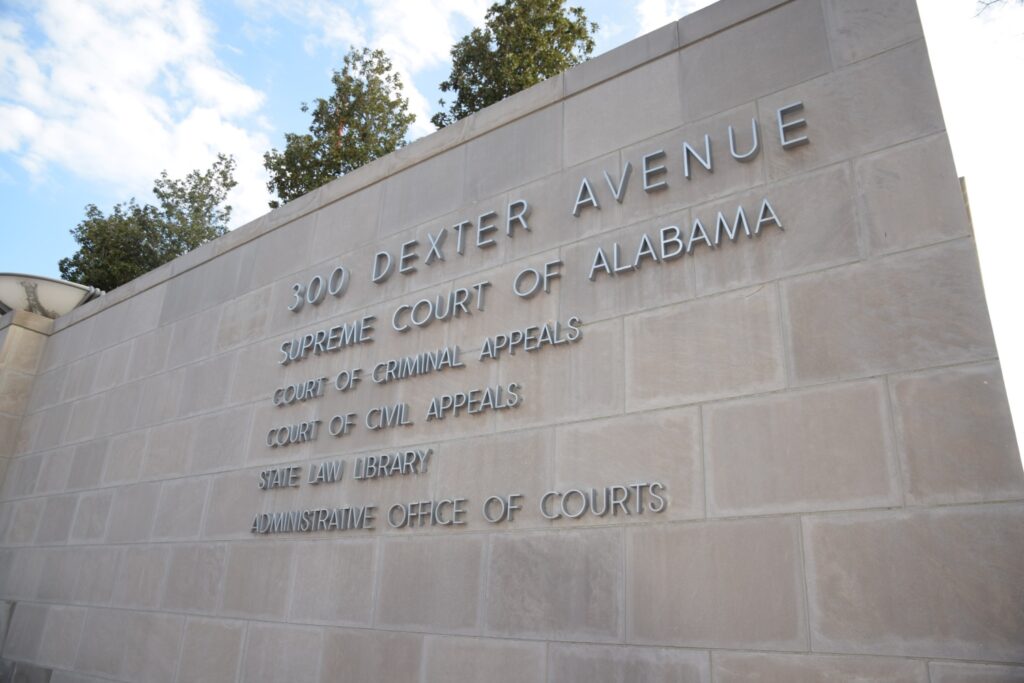
Major party qualifying ended on Friday. Four Republican Alabama Supreme Court Justices won election when no opponent – Republican or Democrat came forward. Justices Will Sellers, Tommy Bryan, and Jay Mitchell were all effectively re-elected as they face no Republican primary challenger. Write-in candidates are not allowed in party primaries. No attorney qualified for any of these races as a Democrat, so they are unlikely to face an opponent in the November general election. Chris McCool gave up his seat on the Court of Criminal Appeals to run for the open Place 1 associate supreme court justice seat. He also had no Republican or Democratic opponent qualify. On the Alabama Court of Criminal Appeals, Republican incumbent Judges Richard Minor and Bill Cole were both effectively re-elected when no Republican or Democratic opponent qualified for either race. Two Republicans: Rich Anderson and Thomas Govan, qualified for the open Place 2 seat that Chris McCool is leaving to run for Supreme Court. Both Govan and Anderson work in the Alabama Attorney General’s office. No Democrat qualified for that seat either, so Govan and Anderson’s race in the Republican primary on March 5 is likely to decide this race. On the Alabama Court of Civil Appeals incumbents Christy Edwards and Terry Moore were both effectively re-elected when qualifying ended without either facing any opposition. The only incumbent appellate judge in the state to face a challenger is Republican: Republican Chad Hanson at Place 2 on the Court of Civil Appeals is being challenged in the Republican primary by Stephen Davis-Parker. There are four candidates running for Chief Justice of the Alabama Supreme Court. Chief Justice Tom Parker, also a Republican, cannot run again due to the state’s arcane mandatory retirement age for judges provision. Associate Justice Sarah Stewart is giving up her place 1 seat on the court to run for Chief Justice. Former State Senator Bryan Taylor is also running for the office. Taylor is also a former legal counsel for Governors Kay Ivey and Bob Riley. On Friday, Montgomery attorney Jerry Michael Blevins also qualified to run for Chief Justice. Chief Justice is the only state appellate race that the Alabama Democratic Party is even contesting. Judge Greg Griffin will face the eventual Republican nominee for Chief Justice in the November general election. Griffin presently is a Circuit Court Judge in Montgomery’s Fifteenth Judicial Circuit Court. Thirty years ago, Democrats dominated the Alabama appellate courts. That changed in 1994 when retired Judge Perry Hooper Sr. defeated incumbent Sonny Hornsby in a contested race for chief justice. In the years since, Republican fortunes have continued to improve. Only one Democratic candidate, Doug Jones in 2017, has won any statewide race since 2008, and no Democratic judicial candidate has won a statewide race since Sue Bell Cobb was elected Chief Justice in 2006. Democrats are hopeful that Judge Griffin can change their fortunes next year. There is still a slight possibility that an attorney could still qualify as an independent or third-party candidate for one of these offices. To connect with the author of this story or to comment, email brandonmreporter@gmail.com
Bryan Taylor qualifies for Chief Justice
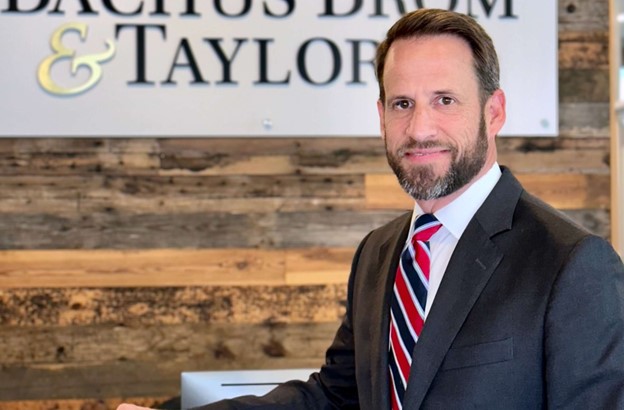
Former State Senator Bryan Taylor (R-Prattville) formally qualified with the Alabama Republican Party for the office of Chief Justice of the Alabama Supreme Court on Monday. In a statement, Bryan contrasted his record with his opponent, Associate Justice Sarah Stewart. Incumbent Chief Justice Tom Parker (R) is barred from running for another term due to a provision in Alabama law that limits judges from running after their 70th birthday. The Legislature has not imposed similar restrictions on other constitutional officers like the Governor or themselves. Taylor is a former Alabama Republican Party legal counsel and a former legal counsel to Governors Bob Riley and Kay Ivey. “The Republican voters of this state deserve the chance to make an informed decision on who will lead our judicial system,” Taylor said. “Justice Stewart and I have different experiences, different judicial philosophies, and different visions for the future of our court system.” Taylor challenged Stewart to a debate. “Today, I call on Sarah Stewart to join me for an honest discussion of those topics so the voters of Alabama can decide who is most qualified to be our next chief justice of the Alabama Supreme Court,” Taylor said. “Sarah Stewart is the establishment candidate. I’m the conservative alternative with a proven record of defending the Constitution.” “I am a lifelong conservative Republican,” Taylor said at a campaign event in Shelby County last week. “Sarah Stewart can’t hide behind her robe anymore, pretending to be a conservative Republican,” said Taylor. “As a circuit judge, she had a liberal record on the bench. Sarah Stewart’s campaigns for the Supreme Court have been bankrolled by hundreds of thousands of dollars from plaintiffs’ trial lawyers and liberal Democrats. She has arguably been the most liberal justice on the Supreme Court,” stated Taylor. “We need a reliably conservative chief justice who will always stand on the truth and stand up to the weaponization of our justice system. I’m not going to let liberal special interests hijack our Republican primary.” “I am from Hoover. I went to Berry High School,” Taylor said. “I went to the University of Alabama on a full Army ROTC scholarship. I went to law school at the University of Texas. I graduated in 2001, just before 9/11. I entered the active duty Army. I served four years in the Judge Advocate Corps. I served in Iraq for a year. I did a deployment in Honduras.” As a freshman state senator, Taylor spearheaded the passage of sweeping reforms to strengthen Alabama’s ethics laws, led the charge to repeal the legislature’s pay raise, and fought for fiscal conservatism in state budgeting. As chairman of the Senate Constitution & Elections Committee, Taylor advanced legislation to curb election fraud and improve election integrity, such as the law that requires voters to show a photo ID at the polls. Taylor is a co-founding member of the law firm of Bachus Brom & Taylor, LLC. He concentrates his practice on Constitutional law, appellate law, election law, business law and business litigation, and public policy. Taylor lives in Shelby County with his three children. They attend Double Oak Community Church. Taylor is the former spouse of congressional and U.S. Senate candidate Jessica Taylor. The major party primary is on March 5. To connect with the author of this story or to comment, email brandonmreporter@gmail.com.
Bryan Taylor, governor’s ex-chief legal adviser, to run for Alabama Supreme Court chief justice

Republican Bryan Taylor, a former state senator and former chief legal adviser to Gov. Kay Ivey, announced Wednesday that he is running for chief justice of the Alabama Supreme Court. The election for chief justice will be held next year. Chief Justice Tom Parker cannot run again because Alabama law prohibits judges from being elected or appointed after age 70. “I am uniquely qualified to lead our state’s court system,” Taylor said in a statement. “My experience as an attorney, Army Judge Advocate, and military prosecutor, along with my service in the executive and legislative branches of state government, has given me a unique perspective that will benefit Alabama’s courts and the Alabamians they serve.” The Alabama chief justice serves on the state’s highest court and also serves as the administrative head of the state court system. Taylor was elected to the Alabama Senate in 2010 and is best known for authoring the revamp of the state’s ethics law that was later used to prosecute former House Speaker Mike Hubbard. Taylor did not seek a second term in 2014. Before joining the Senate, Taylor was a legal adviser and policy director for Gov. Bob Riley. He later served as Ivey’s chief legal adviser. Taylor is an Iraq War veteran and served as a military prosecutor and lawyer with the Army Judge Advocate General Corps. He continues to serve in the Alabama National Guard. He was awarded the Bronze Star Medal for his service in Iraq. Taylor recently served as deputy legal counsel for legislative affairs for the Alabama Republican Party. He is stepping down from the position as he runs for office. Republished with the permission of The Associated Press.
Steve Flowers: Alabama has a host of outstanding political leaders under 45

It may appear to you and most casual observers of Alabama politics that our Alabama elected officials are old. That observation is accurate when you observe our current leaders in the highest offices. The governor’s office has been held by mature folks in recent years. Our current Governor, Kay Ivey, is 78 and has been the object of national media humor for appearing to be a pistol-toting great-grandmother. Dr. Robert Bentley, her predecessor, was in his 70’s, but he may have been sprier than he appeared. Bob Riley was no spring chicken while governor at age 65, although he looked younger. Our iconic senator, Richard Shelby, retired in January at 88 after a record-breaking 36 years in the U.S. Senate. Our new Senior Senator, Tommy Tuberville, is 68. This was not always the case in the Heart of Dixie. In the period from 1930 through 1970, we elected the youngest political leaders in the nation, beginning with our legendary tandem of United States Senators Lister Hill and John Sparkman, who served together close to 30 years. Lister Hill was elected to Congress from Montgomery in 1923 at age 29 and was elected to the U.S. Senate at age 44. John Sparkman was elected to the U.S. Senate in 1946 at 46 after serving as the Congressman for the Tennessee Valley. If you think Hill and Sparkman were young when they went to Washington, you have not seen anything like the governors we elected from 1946 -1966. James E. “Big Jim” Folsom was 38 when he was elected in 1946. John Patterson was 37 when he was elected in 1958. Patterson was referred to as the “Boy Governor.” When George Wallace was elected to his first term in 1962, he was only 43. When his wife Lurleen Wallace was elected in 1966, she was 40. She died in office of cancer less than two years later at 41. Lurleen Wallace was succeeded by Lt. Governor Albert Brewer, who had been Speaker of the Alabama House at 34, Lt. Governor at 38, and was 39 when he became governor. Bill Baxley was the youngest Attorney General in America when he was elected Attorney General of Alabama at 29 years old in 1970. He had been a 25-year-old District Attorney in Houston and Henry Counties. Baxley still practices law in Birmingham at 81. Well, folks, a cursory look at our current top elected officials may appear old. However, we have a generation of young political leaders arriving on the scene in Alabama. We already have superstars on the horizon and already on the scene who are under 45. Our new United States Senator, Katie Britt, is only 40 years old. She has the ability and youthfulness to be one of Alabama’s greatest senators. She has gotten to the Senate at a younger age than Hill, Sparkman, or Shelby. Marshall County has become the hotbed and breeding ground for the next generations of Alabama political leaders. This beautiful pristine lake area of North Alabama lays claim to Lt. Governor Will Ainsworth, age 41, State Senate Majority leader Clay Scofield, age 42, and State Representative Wes Kitchens, who is 35 and is Vice Chairman of the House Republican Caucus. Andrew Sorrell, the newly elected State Auditor, is only 37. He has a bright future. The brightest star in the Democratic ranks is Huntsville State Representative Anthony Daniels. At age 40, Daniels is a superstar. He is in his third term in the House from Huntsville. He is the Minority Leader in the House. This gentleman is also a successful high-tech businessman in Rocket City. There are several other stars under 45 in the Alabama House of Representatives besides Daniels and Kitchens, including Kyle South of Fayette, Matt Simpson of Daphne, Joe Lovvorn of Auburn, Ben Robbins of Sylacauga, Scott Stadthagen of Madison, Corey Harbison of Cullman, and very young newcomers James Lomax of Huntsville and Brock Colvin of Albertville. Joining the affable and accomplished 42-year-old Senate Majority Leader, Clay Scofield in the powerful State Senate in the under 45 superstar group are Senator Chris Elliott, 42, of Baldwin, Senator Andrew Jones, 38, of Cherokee, and newly elected Senator Josh Carnley from Coffee County who is 44. Alabama has a host of under 45 political leaders. See you next week. Steve Flowers is Alabama’s leading political columnist. His weekly column is seen in over 60 Alabama newspapers. Steve served 16 years in the legislature. He may be reached at: www.steveflowers.us.
Sarah Stewart running for Alabama Chief Justice
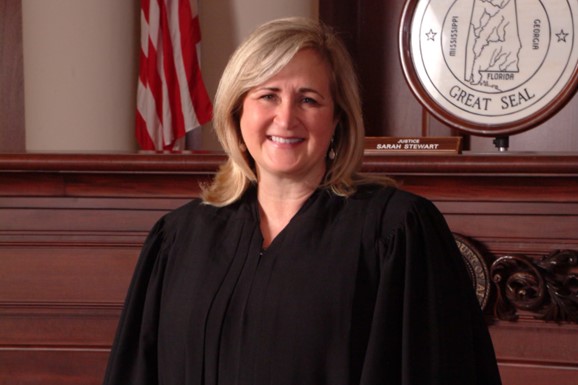
Alabama Supreme Court Justice Sarah Stewart announced that she will seek the Republican Party nomination for Chief Justice of the Alabama Supreme Court in the March 2024 primary election. Chief Justice Tom Parker currently holds the state court’s top job. However, state law prohibits him from seeking another term. “I will fiercely safeguard our freedoms enshrined in the Constitution – from the right to praise God freely to the power of state government,” Justice Stewart announced. “Five of the original ten amendments to the US Constitution are about the justice system, and as Chief Justice, I want Alabamians to be confident in the strength of our courts.” Justice Stewart was elected as a Republican in November 2018 for a six-year term as an Associate Justice on the Alabama Supreme Court. Prior to her election, Justice Stewart served for thirteen years as a Circuit Judge in Mobile County, where she handled over 1,800 criminal and civil cases per year. Justice Stewart was appointed Circuit Judge by Governor Bob Riley in January 2006 and was elected as a Republican without opposition in November 2006, 2010, and 2016. “I am humbled by and take seriously the faith Alabama citizens placed in me by electing me to the trial court bench three times and then to the highest court in our State in 2018,” Stewart added. “I have a proven conservative record, and I understand Alabama values. It is important for a Justice to have strongly developed judicial values. My work as a Justice speaks for itself – I will never legislate from the bench, and I will always strongly defend your constitutional rights.” Justice Stewart earned her J.D. from Vanderbilt Law School in 1992. She earned her B.A. and M.A. from the University of Arkansas. She is married to Craig Richard Stewart, originally of Selma. They have two children and are members of Ashland Place Methodist Church.
Libertarian Jimmy Blake says state needs to change ballot access law
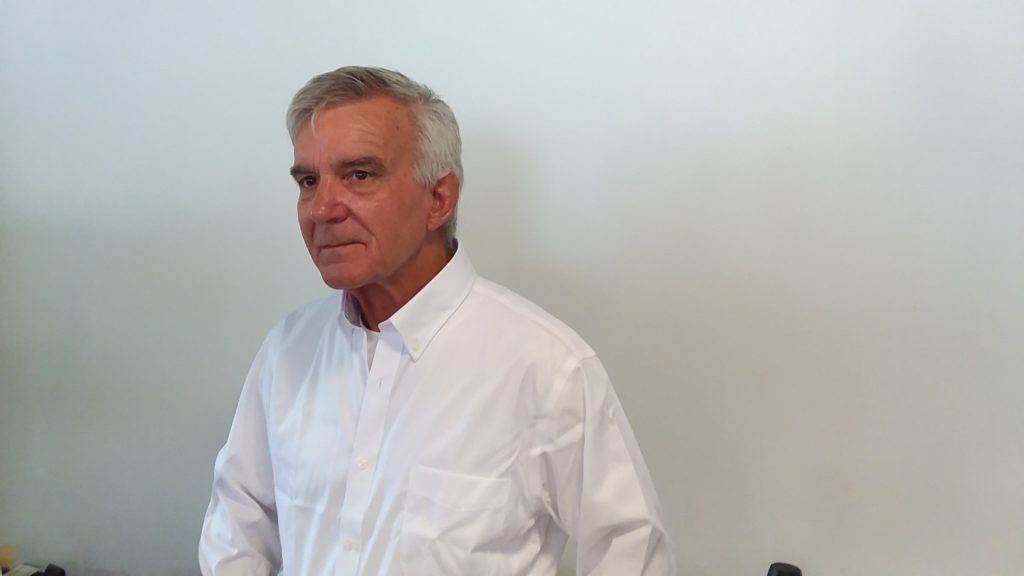
On Friday, Jimmy Blake told Alabama Today that the State of Alabama has the most restrictive ballot access law in the country and that that needs to change. Blake was the Libertarian Party of Alabama nominee for governor in last week’s general election. On November 8, Blake received 45,823 votes – 3.25 percent of the votes cast – in his failed bid to be governor of Alabama. Kay Ivey was reelected to another term with 944,845 votes – 66.93% of the vote. Blake also was unable to achieve a high enough threshold for the Libertarian Party to have automatic ballot access in the 2024 election. “In 48 states, all but Kentucky and Alabama, I would have gotten enough votes for the party to have had ballot access,” Blake said. For a minor party to remain on the ballot in Alabama, one of its statewide candidates has to achieve 20% of the general election vote. Democratic nominee Yolanda Rochelle Flowers received just 29.16% of the vote in the governor’s race. That was the poorest showing for a Democratic gubernatorial candidate in Alabama history, down from Walt Maddox’s 40.4% just four years ago. None of the 65 Libertarian candidates on the ballot in last Tuesday’s general election were victorious. In the U.S. Senate race, Libertarian nominee John Sophocleus received just 2.32% of the vote (32,790 votes), and Democratic nominee Will Boyd received 30.87% (435,428 votes), while Republican Katie Britt received 66.64% (940,048 votes). Where Libertarians did best were in races where there was a Republican running but no Democrat. In the Lieutenant Governor’s race, Republican incumbent Will Ainsworth coasted to victory with 83.69% of the vote (955,372 votes). Still, with no Democrat in the race, his Libertarian opponent, Ruth Page Nelson, received 15.60% of the vote – 178,069 votes – still short of that 20% threshold required by Alabama state law. 1,411,756 people voted in the governor’s race, but only 1,141,507 votes in the Lieutenant Governor’s race, a drop off of 270,639 voters. Many of those voters who dropped off the ballot were Democrats who voted a straight-party ticket without making a preference in races where the Alabama Democratic Party failed to recruit a candidate. Candidate qualifying was over, and the ballot was set before new Democratic Party Chairman Randy Kelley was even elected. No Democrat won a statewide race on Tuesday. In fact, Doug Jones’s surprise victory over former Chief Justice Roy Moore in the 2017 special election for U.S. Senate is the only win for a Democrat in a statewide race in Alabama since 2008. The unlikely chance that a Democrat can win a statewide race in Alabama has made it extremely difficult for the Alabama Democratic Party to recruit candidates or for Democratic or non-Republican candidates to raise money. Where Libertarians came closest was in the race for Public Service Commission Place 2 race. There incumbent Republican Chip Beeker received 83.18% (929,248 votes), while Libertarian nominee Laura Lane received 16.05% (179,302 votes). “Laura Lane had enough votes for 49 states, even Kentucky, which has the second hardest ballot access at ten percent,” Blake said. The Libertarian candidates for PSC Place 1, State Auditor, and Commissioner of Agriculture and Industries all received over 14 percent of the vote in addition to Lane and Nelson. Blake said that Libertarians would be asking the Legislature to reform the state’s ballot access law. The last time the Libertarian Party of Alabama had ballot access was 2002. Then Sophocleus received more votes than the deciding margin between incumbent Democrat Don Siegelman and winner then-Congressman Bob Riley. Following that heavily contested race, the State Legislature changed Alabama’s ballot access laws to make it more difficult for minor parties to qualify for ballot access. The state requires a minor party or an independent candidate to turn in ballot access signatures of registered voters. To gain ballot access in this election cost the Libertarians over $240,000 and weeks of canvassing. The Party only completed the work in the days before the May 24 deadline. Without intervention by the Legislature or the court system, Libertarians will have to repeat that process if they hope to run statewide candidates in 2024. The 2024 election will include the statewide offices of President, PSC President, Alabama Supreme Court, and appellate judge. To connect with the author of this story, or to comment, email brandonmreporter@gmail.com.
Jimmy Blake addresses Libertarians in Homewood

Libertarian nominee for Governor of Alabama Dr. James “Jimmy” Blake addressed the Libertarians of Greater Birmingham at a dinner event at Jim’ N Nick’s barbecue restaurant in the greater Homewood area on Tuesday night. “I am a former chairman of the (Libertarian) Party,” Blake said. “I have been involved with the Libertarians really since the 1970s. I was chairman of the Libertarian Party when I was elected to the city council. I am very proud of some of the things we accomplished back then.” Blake is a career doctor, an Air Force veteran, and a former Birmingham City Councilman. “Our party has not been on the ballot since 2002,” Blake said. “Then John Sophocleus got more votes than the Republican margin of victory over Don Siegelman, and the Republicans and Democrats agreed that they did not want competition.” Sophocleus finished third in the 2002 gubernatorial election behind then-Congressman Bob Riley and then Governor Siegelman. Sophocleus is the 2022 Libertarian nominee for U.S. Senate. “We have, I think, 65 candidates on the November ballot, and 50 of them are only running against a Democrat or a Republican,” Blake said. “Without them, the voters would not have any choice in those races.” Blake attacked both of the major political parties. “I call them the blue ticks and the red ticks because they are both sucking us dry,” Blake said of the Democrats and the Republicans. “One thing that they agree on is that they don’t want competition.” Alabama law requires a political party that did not have a candidate get 20 percent of the vote in the latest gubernatorial general election ballot to get signatures from registered Alabama voters to gain ballot access. “It cost us a quarter of a million dollars to get ballot access,” Blake explained. “Ballot access petitions – it sounds fine but go out there and get ten of them, and it’s harder than it sounds. We had to have 85,000. We need 20% of the vote in one of these statewide races to keep ballot access.” “Getting name ID is probably the biggest challenge that we face,” Blake said. “There may be 50,000 people in the state that even know that I am running. We need somewhere between 300,000 and 350,000 votes to get ballot access.” Blake said that inflation is another way that government takes money away from the people. “I have a 1962 dime that I keep in my pocket,” Blake stated. “A pre-1964 dime is 90% silver. It is worth two dollars and ninety cents today, while a Biden dime is worth ten cents. Since 1964 our money has lost over 95% of its value.” Blake argued that both political parties are responsible for the current situation. “Both of them are spending more money than we can justify,” Blake said. Blake said that he and other Libertarian candidates are circulating a petition for the Alabama Legislature to pass the Firearms Protection Act, which would prohibit state or local officials from participating in any federal gun seizure efforts. “The blue ticks are trying to take away our firearms away, and there is a reason for that. You can’t impose tyranny with an armed population,” Blake stated. Blake said that the Libertarians are getting pushback from the Republicans, which control the state. “The Republicans now are threatened by us,” Blake said. “They are threatening their own people that they can’t run as a Republican for six years if they support one of us. Now they are trying to close their primaries even though they are supported by the taxpayers. If they are funded by tax dollars, I ought to be able to vote in all the primaries. It did not cost one tax dollar to get our 65 candidates on the ballot.” Blake said that he supports substantive tax reform and not tax rebates. “My first priority is to get rid of the Alabama income tax,” Blake said. “Our income tax makes us noncompetitive with other states. Florida does not have one. Neither does Tennessee, and Mississippi is phasing theirs out. Georgia passed over $2 billion in tax cuts, while we increased the gas tax and some piddling tax cuts.” Blake urged people to volunteer for his campaign. “We need bodies. We need manpower at every level,” Blake said. “We could sure use some help. We have gotten great support from some of our technical people. I used to know how to run a campaign, but it is all different now.” Blake is running against incumbent Republican Governor Kay Ivey and Democratic nominee Yolanda Rochelle Flowers in the November 8 general election. To connect with the author of this story, or to comment, email brandonmreporter@gmail.com.
Hearing on voting machine lawsuit is today
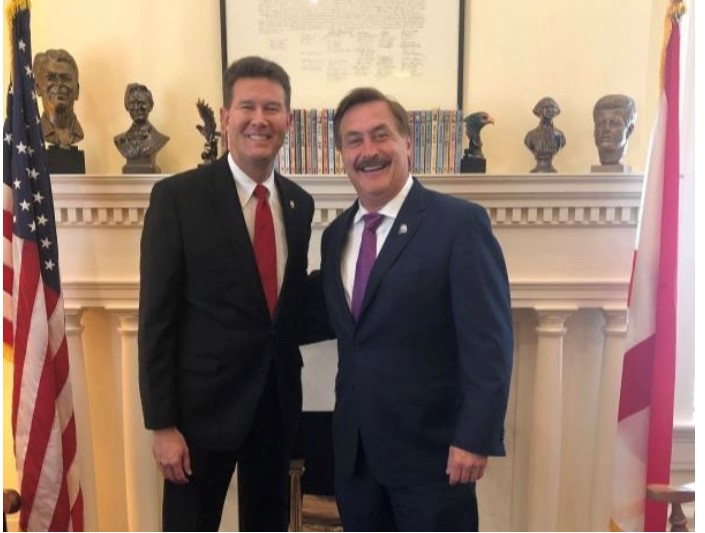
A judge will hear a motion to dismiss a lawsuit challenging the use of vote counting machines today in Montgomery at 9:00 a.m. The lawsuit was originally brought by Republican primary candidate Lindy Blanchard and State Rep. Tommy Hanes. The candidates had originally sought to bar the use of the vote tabulation machines in the May 24 Republican primary. Both Hanes and Blanchard lost in the primary. Hanes, the incumbent, lost to challenger Republican Mike Kirkland 3,707 48.4% to 3,950 51.6%. Kirkland is unopposed in the general election. Blanchard finished second to incumbent Gov. Kay Ivey, but the popular incumbent received 54.8% of the vote in the primary, besting Blanchard and seven other primary opponents combined to avoid a Republican primary runoff. No incumbent governor in Alabama has lost their party primary since George C. Wallace beat incumbent Gov. Albert Brewer in the 1970 Democratic primary. Three incumbents have lost general elections. Failing to block the machine tabulation of both the primary and primary runoff votes, the lawsuit is now just challenging the use and accuracy of the machines in general. Blanchard has left the lawsuit, which is being supported by My Pillow founder and CEO Mike Lindell. Former Gov. Don Siegelman has taken Blanchard’s place in the lawsuit. Siegelman, the last Democratic governor in Alabama history, maintains that he actually won the 2002 general election to then-Congressman Bob Riley. The Republican Party has won the last five gubernatorial elections, and incumbent Gov. Kay Ivey is expected to win re-election on November 8. The Alabama chapter of the ultra-MAGA group Focus On America (FOA) is continuing to support the lawsuit. Supporters and members of the group are being asked to attend Tuesday’s hearing to show support. Signs will not be allowed in the courtroom. Secretary of State John H. Merrill has maintained that the vote counting machines, which do not connect to the internet, are both safe and accurate. Merrill said in a statement after meeting with Lindell, “Every Alabamian should be proud that Alabama was recognized as the gold standard for election administration for the first time in our state’s history by the Concerned Women for American Legislative Action Committee. We will continue to work with those like Mr. Lindell and other concerned citizens to provide complete transparency.” Alabama Attorney General Steve Marshall has filed a motion to dismiss the lawsuit citing a lack of grounds. If the motion to dismiss is denied, the case could move forward to the trial stage in the coming weeks. Merrill maintains that replacing the vote tabulation machines with hand counts by poll workers, like Russia and some countries still use, will slow the vote counting down and add an opportunity for potential fraud as well as mistakes by the human vote counters. To connect with the author of this story, or to comment, email brandonmreporter@gmail.com.
4 Republicans vying for secretary of state nomination

Four Republicans are vying for the nomination for Alabama secretary of state, the official responsible for overseeing state elections. Ed Packard, who worked in the secretary of state’s elections division for nearly 25 years, faces State Auditor Jim Zeigler, state Rep. Wes Allen of Troy, who served nearly a decade as probate judge in Pike County; and Christian Horn, a GOP activist and business owner from Madison County. The primary election will go to a June 21 runoff unless one candidate captures over 50% of the vote on Tuesday. The GOP nominee will face Democrat Pamela J. Laffitte of Mobile in November. Packard has worked in the elections division of the Secretary of State’s Office for nearly 25 years, helping to administer over 400 elections and training county and city election officials. He said he also worked to defend the state’s photo ID requirements. Maintaining election integrity is a primary function of the office, he said. Packard said he wants to see stiffer penalties for violating state election laws, noting some of the offenses are only misdemeanors. “There is a $500 fine for littering, a $500 fine for buying a vote. That needs to be changed,” Packard said at a candidate forum hosted by the League of Women Voters of Alabama. Packard said he would also like to give voters the ability to opt-out of the state selling their information to private groups. Separately, Packard in 2006 reported then-Secretary of State Nancy Worley to the attorney general for soliciting campaign contributions and support from her state employees. Worley later pleaded guilty to a misdemeanor charge. Allen, a state legislator and a former probate judge of Pike County, is also stressing his experience. “I’m the only candidate in the race that’s been a chief election official,” Allen said. He also pointed to his legislative work on election issues. Allen was appointed to serve as a probate judge of Pike County in 2009 by then-Gov. Bob Riley and won election in 2012. After being elected to the Alabama House of Representatives, he sponsored legislation to ban curbside voting as well as a bill to make it illegal for election offices to accept private donations for voter education, outreach, and registration programs. Alabama was one of several GOP-controlled states that banned such donations — a movement fueled by conservatives’ suspicion about donations by Facebook founder Mark Zuckerberg in 2020 to help offices deal with the coronavirus pandemic. Republicans argued it is needed to protect election integrity; opponents said it would hinder election administration in poor counties and have a chilling effect on efforts to help people register and vote. Zeigler was elected as state auditor in 2014 and cannot seek re-election because of term limits. The role of state auditor is to keep track of state property. However, Zeigler turned the office into a public platform to weigh in on other state issues, often serving as a gadfly to Republican administrations in the state. Zeigler in 2016 filed an ethics complaint against then-Gov. Robert Bentley, accusing him of misusing state resources after audio leaked of the governor having a romantically charged conversation with a top aide. “I will move the watchman role I played as state auditor to the secretary of state’s office as a watchman for election integrity,” Zeigler wrote in an email. He said he also wants to focus on the business organizations section and the role the office plays in paperwork for international adoptions. Horn, a GOP activist and business owner from Madison County, has stressed his outsider status and support for election security measures, such as voter identification requirements. Horn said he wants hand-count audits of every election as a means to fight election fraud. Horn, who is African American, noted his parents and ancestors had to fight for the right to vote, including his World War II veteran grandfather, but he also criticized what he called modern-day “woke politics” as destructive. “I will lead all people, as a son and grandson of parents who could not vote, and a brain aneurysm survivor who was paralyzed and cared for by women and men of all races, I want to use my platform to be a bridge to bring people together,” Horn said. Horn is chairman of the Tennessee Valley Republican Club and played football for the University of Michigan. Republished with the permission of The Associated Press.
Todd Stacy’s inaugural Capitol Journal show to air January 7
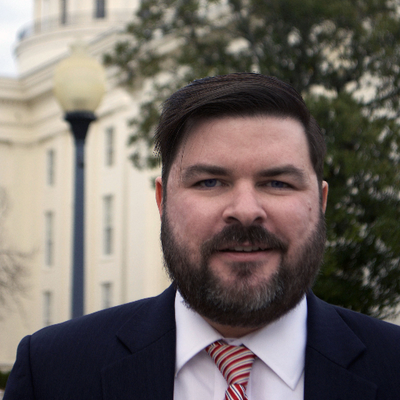
Alabama Public Television’s public affairs series CAPITOL JOURNAL will begin the new year with its new host, Todd Stacy. Stacy, a Montgomery resident and publisher of Alabama Daily News, is taking over the reins on January 7 after previous host Don Dailey retired in December after 10 years in the anchor’s chair. Stacy will join veteran reporters Karen Goldsmith and Randy Scott as the Alabama Legislature begins its 2022 regular session. “I’m grateful to the Alabama Public Television leadership for their confidence in me to host such a meaningful news space in Alabama politics,” Stacy said. “I grew up watching APT and have enjoyed working with their team professionally over the years. It’s more than a little intimidating to fill the shoes of Don Dailey, who is a mainstay at the State House and universally well respected, but I’m honored by the opportunity and eager to get started.” Stacy is a veteran of both Washington, D.C. and Montgomery politics. He previously worked for former Gov. Bob Riley and former U.S. Rep. Martha Roby. He launched Alabama Daily News in January 2018 and will continue as publisher. Phil Hutcheson, interim executive director and CFO of Alabama Public Television stated, “We are excited to welcome Todd Stacy to the team. Viewers can rely on CAPITOL JOURNAL for straight-forward and balanced coverage of news from Montgomery and around the state and the most in-depth television coverage of the Legislature available.” Guests for this Friday’s show include Senate President Pro Tem Greg Reed, House Minority Leader Anthony Daniels, Finance Director Bill Poole, and State Health Officer Dr. Scott Harris.

